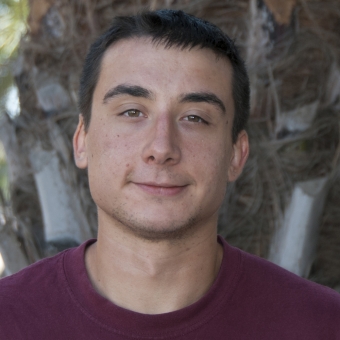
Graduate Student Jonathan Martin of the Fredrickson Group was awarded a Mitsubishi Chemical Fellowship from the Mitsubishi Chemical Center for Advanced Materials for the period 2016-19. We asked Jonathan a few questions about his research, what he likes about UCSB, and advice he has for high school students and undergrads interested in a similar path. Read on to see what he had to say!
What is your area of study?
I study polymeric systems in which electrostatic interactions have a profound effect on structure and properties.
What kind of projects or research are you currently working on? And what do you find most exciting about it?
My research has been in the thermodynamic description of novel electrostatic phenomena in polymeric and other soft material systems. Using a combination of analytical and computational techniques, we predict equilibrium properties in phase-separated soft materials with polarizable and/or charged molecular species. In addition to broadening the knowledge base for these systems, the physical predictions of our theory also have the potential to inform design of industrial soft materials for which controllable electrostatic properties are of utmost importance, such as thermoelectric materials and electrolyte solutions for electrochemical cells (e.g. batteries and supercapacitors). I am particularly excited about the simplicity and fundamental rigor of the theory: without imposing any assumptions beyond bare electrostatic interactions, we naturally generate a rich tapestry of interesting properties and behaviors.
Why did you choose to come to UCSB?
I chose to pursue my Ph.D. at UCSB because of the strong presence of theoretical/computational research groups, as well as the incredibly collaborative atmosphere that exists between experimental and theoretical soft matter researchers in the chemical and materials engineering departments. Having access to so many perspectives has made my time here an incredibly enriching experience and provided me with a greater understanding of the scope, applicability, and physical significance of my project.
If a high school or undergrad student wanted to do what you do today, what is the best way to get there? What advice do you have to offer for high school students or undergrads who are trying to figure out what they want to do?
I would highly recommend actively pursuing any concept or field of study you find interesting -- whether that means spending your free time learning a new topic or skill, taking a class that is not required by your major, or even adding or changing a major. As I worked my way through programming tutorials in high school, and then later through computer science and computational mathematics classes as an undergrad, the path to my current position as a graduate student naturally developed; however, none of this was apparent to me when I first began -- I just wanted to learn to code.
Thanks, Jonathan!



